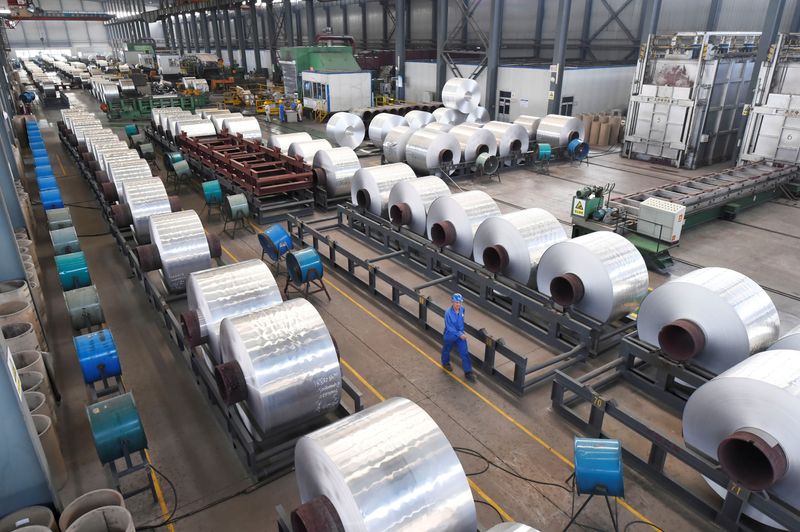By Amy Lv and Pratima Desai
BEIJING/LONDON (Reuters) – New capability for changing bauxite into alumina due on-line subsequent 12 months is ready to ease tight provides and probably halt a record-breaking worth rally of the fabric used to make aluminium.
Larger alumina costs outdoors China have turned the highest producer and client right into a web exporter this 12 months from a web importer and boosted costs of aluminium, which is used within the transportation, building and packaging industries.
Disruptions in provides of bauxite from Guinea and Brazil and output suspensions in Australia contributed to a 70% surge in alumina costs this 12 months to a file 5,645 yuan ($779.77) per metric ton on the Shanghai Futures Alternate. Aluminium costs are up round 7% this 12 months.
“There doesn’t seem to be an end to this tightness of alumina, not immediately,” mentioned Eivind Kallevik, CEO at Norwegian aluminium producer Hydro.
“New alumina refineries expected to start up in Indonesia and India will add more tons to the market.”
International alumina provides final 12 months totalled 140 million metric tons, in keeping with the U.S. Geological Survey, unchanged from the earlier 12 months.
Extra provide is within the pipeline.
In China, greater than 13 million tons of recent capability is because of come on-line subsequent 12 months, in keeping with info supplier Shanghai Metals Market (SMM).
In India, Vedanta (NYSE:) plans to put money into a plant with annual capability for six million tons of alumina by 2026. In Guinea, an arm of Emirates International Aluminium plans to construct a 2 million tons-a-year alumina refinery, slated to open in September 2026.
And in Indonesia, two state corporations plan to double capability at their refinery in West Kalimantan province to 2 million tons however haven’t specified a timeline.
In the meantime, elevated alumina costs and better revenue margins are anticipated to additional incentivise use of China’s capability, including to provide. China’s alumina capability of 102.7 million tons is being utilised at a price of 83.6%, SMM mentioned.
“Alumina (OTC:) producers have shown strong willingness to maintain a high operating rate this year spurred by handsome profit margins,” analysts at China’s state-backed analysis home Antaike mentioned.
“But production might be affected if heavy pollution this winter lasts a long time, exacerbating tight supply.”
LOOMING SURPLUS
China’s January-September alumina exports rose 33% from the identical interval final 12 months to 123.57 million tons, fetching a mean worth of $541 a ton, about 10% greater than the worth on the Shanghai change over the identical interval.
Some analysts, seeing a looming oversupply, forecast decrease alumina costs for 2025. UBS predicts a mean worth of three,600 yuan a ton in 2025, whereas Antaike pegs it at 4,000 yuan a ton.
“We expect China’s alumina market to step into a supply glut from February and the price will slide as a result,” mentioned Sharon Ding, head of China fundamental supplies at UBS.
In China, SMM expects the market to swing to a surplus of 960,000 tons in 2025 from a deficit of 235,000 tons this 12 months, whereas globally UBS expects a surplus of 890,000 tons in 2025 following a scarcity of 920,000 tons in 2024.
Surpluses in 2025 are more likely to be greater if demand development slows due to a government-mandated cap of 45.5 million tons of aluminium manufacturing.
SPOOKED BY DISRUPTIONS
This 12 months’s alumina deficits are as a result of a number of components.
U.S. aluminium producer Alcoa (NYSE:) closed its Australian Kwinana refinery, with annual capability of two.19 million tons, within the second quarter.
In Could, Rio Tinto (NYSE:) declared power majeure on alumina from its refineries in Queensland, Australia. Its Yarwun refinery can produce 3 million tons of alumina yearly. It didn’t reply to a Reuters request for an replace.
“Some big sources of alumina have been lost this year including from Rio Tinto, which isn’t expected to be back at normal production until sometime early next year,” mentioned Liberum analyst Tom Value.
Final week, Alcoa halted bauxite shipments from Juruti Port in Brazil as a result of a stranded vessel, including to nervousness in a market already spooked by export disruptions from Guinea.

Flooding in Guinea earlier this 12 months restricted bauxite shipments, which once more have been disrupted by customs suspending exports by Guinea Alumina Company (GAC), a subsidiary of Emirates International Aluminium (EGA).
($1 = 7.2393 renminbi)




